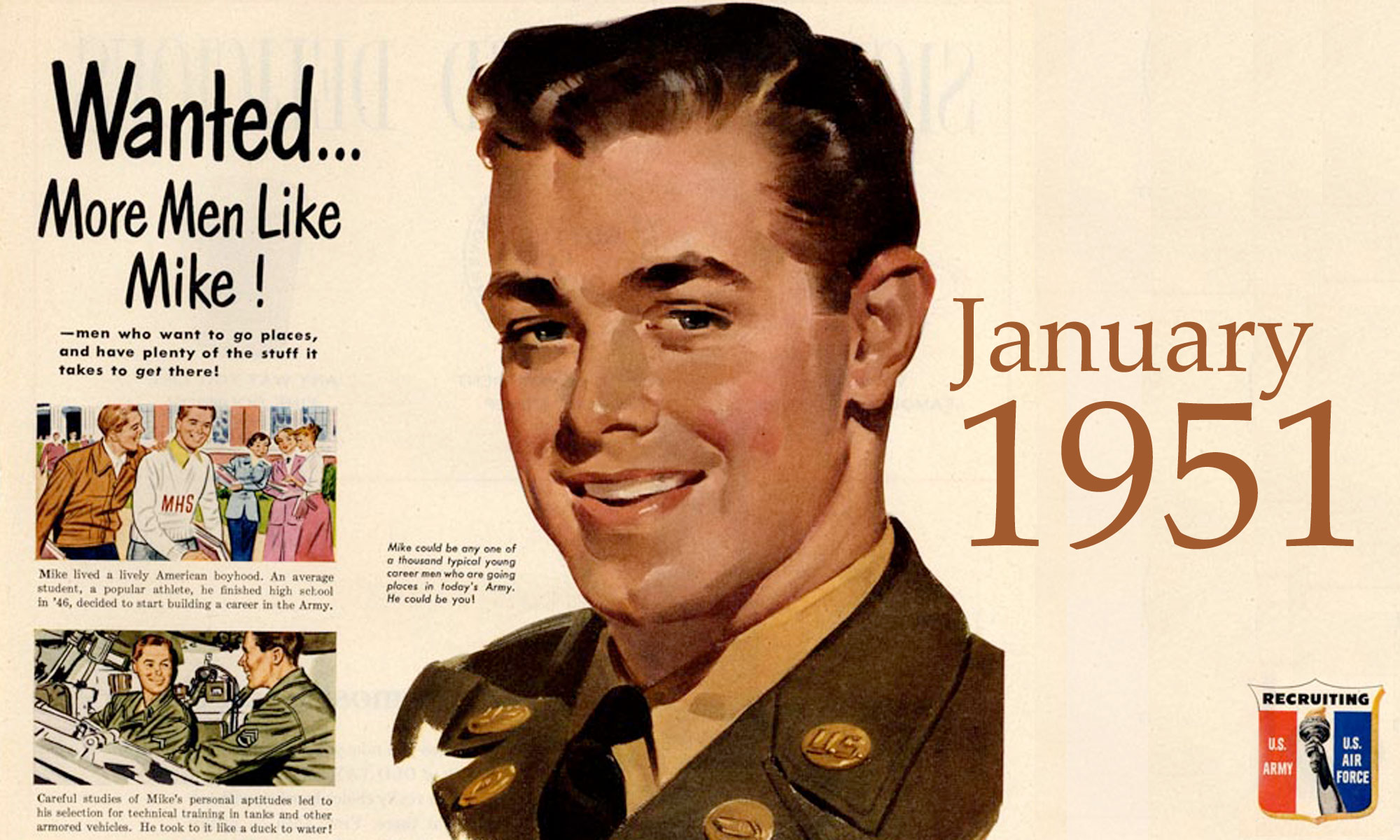| ◄ JANUARY ► | ||||||
|---|---|---|---|---|---|---|
| ◄ 1951 ► | ||||||
| 1 | 2 | 3 | 4 | 5 | 6 | |
| 7 | 8 | 9 | 10 | 11 | 12 | 13 |
| 14 | 15 | 16 | 17 | 18 | 19 | 20 |
| 21 | 22 | 23 | 24 | 25 | 26 | 27 |
| 28 | 29 | 30 | 31 | |||
| President: | Harry S Truman (D) | |||
| Vice-President: | Alben W. Barkley (D) | |||
| House: | 235 (D) | 199 (R) | 1 (Other) | |
| Southern states: | 103 (D) | 2 (R) | ||
| Senate: | 49 (D) | 47 (R) | ||
| Southern states: | 22 (D) | |||
| GDP growth: | 9.2% | (Annual) | ||
| 1.7% | (Quarterly) | |||
| Inflation: | 8.1% | |||
| Unemployment: | 3.7% | |||
| US killed in action, | 735 | (This month) | ||
| Korean conflict: | 15,383 | (Since Jun 28, 1950) | ||
▲Monday, January 1
New Year’s Day
![]() Jan 1: Chinese and North Korean troops launch a major offensive along the 38th parallel just twelve miles northeast of Seoul.
Jan 1: Chinese and North Korean troops launch a major offensive along the 38th parallel just twelve miles northeast of Seoul.
![]()
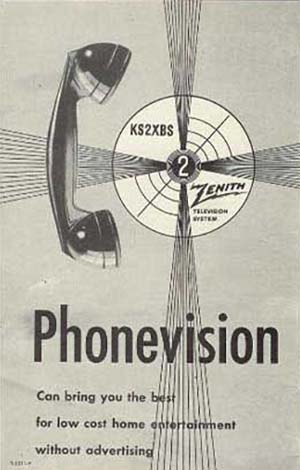 Jan 1: Pay-per-view TV debuts in Chicago. Zenith launches the first public test of Phonevision, the first pay-per-view TV system authorized by the FCC. Three hundred select Chicago families receive a set-top box that’s connected with the house phone line. When the family wants to see a scheduled movie, they call the operator, who sends a “signal key” through the phone line to activate the descrambler when the movie is about to start. Each film costs $1 (about $10.25 today), and is broadcast in a scrambled format over Channel 2 without commercial interruption. And unlike the ancient movies available for broadcast on regular TV, Phonevision’s films are only about two or three years old. Three films make up today’s schedule. April Showers, a 1947 musical, starts at 4:00 p.m. At 7:00, Welcome Stranger, a 1948 Bing Crosby film, is aired. Homecoming, a 1948 film with Clark Gable and Lana Turner, comes on. The three-month trial run is deemed a roaring success, and Chicagoans will enjoy pay-per-view for the next three years until an FCC channel re-allocation causes Zenith to lose its Channel 2 license to CBS affiliate WBBM. Later Phonevision experiments will employ set-top coin boxes or receive the signal key over the air. Unfortunately, the scrambling/descrambling method will prevent color broadcasts when that becomes available. Other Phonevision systems will roll out in New York, Australia and New Zealand. The last Phonevision system shut down in Hartford Connecticut in 1968.
Jan 1: Pay-per-view TV debuts in Chicago. Zenith launches the first public test of Phonevision, the first pay-per-view TV system authorized by the FCC. Three hundred select Chicago families receive a set-top box that’s connected with the house phone line. When the family wants to see a scheduled movie, they call the operator, who sends a “signal key” through the phone line to activate the descrambler when the movie is about to start. Each film costs $1 (about $10.25 today), and is broadcast in a scrambled format over Channel 2 without commercial interruption. And unlike the ancient movies available for broadcast on regular TV, Phonevision’s films are only about two or three years old. Three films make up today’s schedule. April Showers, a 1947 musical, starts at 4:00 p.m. At 7:00, Welcome Stranger, a 1948 Bing Crosby film, is aired. Homecoming, a 1948 film with Clark Gable and Lana Turner, comes on. The three-month trial run is deemed a roaring success, and Chicagoans will enjoy pay-per-view for the next three years until an FCC channel re-allocation causes Zenith to lose its Channel 2 license to CBS affiliate WBBM. Later Phonevision experiments will employ set-top coin boxes or receive the signal key over the air. Unfortunately, the scrambling/descrambling method will prevent color broadcasts when that becomes available. Other Phonevision systems will roll out in New York, Australia and New Zealand. The last Phonevision system shut down in Hartford Connecticut in 1968.
▲Tuesday, January 2
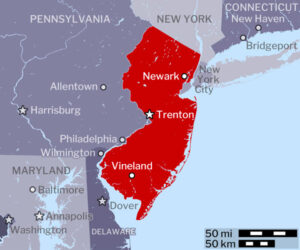 Jan 2: Large cross burned at New Jersey chicken farmer’s home. Police in Vineland, New Jersey, are investigating the burning of a large, 6-foot (1.8 m) cross on the lawn of Herman and Hilda Cyter. The World War II veteran and his wife are at their Landis Township home when, shortly after 11:00 p.m., they see a red glow outside their bedroom window followed by flames. They awaken their three-year-old son and call the police, who in turn call the South Vineland Fire Company. They quickly put out the fire. Police Chief Peter T. Maguire says that “terroristic activities” like this one will not be tolerated. “Any suc actions, if they were done on the part of either groups of individuals or secret organizations, would constitute a threat to minority racial and religious groups such as Negroes, Catholics and Jews.” The Cyters immigrated to the United States in 1940 from Germany, where several of their relatives were killed in Nazi concentration camps. Herman enlisted din the U.S. Army in 1942 and served for five years, half of that time overseas.
Jan 2: Large cross burned at New Jersey chicken farmer’s home. Police in Vineland, New Jersey, are investigating the burning of a large, 6-foot (1.8 m) cross on the lawn of Herman and Hilda Cyter. The World War II veteran and his wife are at their Landis Township home when, shortly after 11:00 p.m., they see a red glow outside their bedroom window followed by flames. They awaken their three-year-old son and call the police, who in turn call the South Vineland Fire Company. They quickly put out the fire. Police Chief Peter T. Maguire says that “terroristic activities” like this one will not be tolerated. “Any suc actions, if they were done on the part of either groups of individuals or secret organizations, would constitute a threat to minority racial and religious groups such as Negroes, Catholics and Jews.” The Cyters immigrated to the United States in 1940 from Germany, where several of their relatives were killed in Nazi concentration camps. Herman enlisted din the U.S. Army in 1942 and served for five years, half of that time overseas.![]() Jan 2: Saudi Arabia to get half of its oil profits. The Arabian American Oil Company announces that it has agreed to share half of its oil profits with the Saudi Arabian government. AAOC, which is jointly owned by four American oil companies, enters into the agreement with the Saudi government after King Abdulaziz privately threatened to nationalize his country’s oil facilities. The agreement is similar to one made between American oil companies and Venezuela a few years earlier. It is widely anticipated that this agreement will spur other Middle East oil states to demand similar agreements with other western oil companies. The agreement, which is retroactive to January 1, 1950, comes as oil production is expanding rapidly in the Middle East, which is set to surpass the U.S. in total oil production.
Jan 2: Saudi Arabia to get half of its oil profits. The Arabian American Oil Company announces that it has agreed to share half of its oil profits with the Saudi Arabian government. AAOC, which is jointly owned by four American oil companies, enters into the agreement with the Saudi government after King Abdulaziz privately threatened to nationalize his country’s oil facilities. The agreement is similar to one made between American oil companies and Venezuela a few years earlier. It is widely anticipated that this agreement will spur other Middle East oil states to demand similar agreements with other western oil companies. The agreement, which is retroactive to January 1, 1950, comes as oil production is expanding rapidly in the Middle East, which is set to surpass the U.S. in total oil production.
▲Wednesday, January 3
![]()
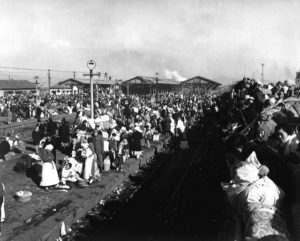 Jan 3: The South Korean government evacuates Seoul for the second time.
Jan 3: The South Korean government evacuates Seoul for the second time.
▲Thursday, January 4
![]() Jan 4: Chinese and North Korean forces capture Seoul for the second time. The allied armies evacuate, destroying Kimpo airport and the port of Inchon behind them.
Jan 4: Chinese and North Korean forces capture Seoul for the second time. The allied armies evacuate, destroying Kimpo airport and the port of Inchon behind them.
▲Friday, January 5
![]() Jan 5: Taft opposes U.S. troops for Europe, calls U.S. action in Korea a usurpation. Sen. Robert A. Taft (R-OH), the most powerful Republican member of Congress and a favorite for the 1952 GOP nomination for President, challenges the Truman Administration’s legal right to send more American troops to Europe without advance approval from Congress. He says he supports air and naval support for defending Europe, but expresses doubts about committing ground troops, even in the case of open hostilities, “unless we are sure it is well within our capacity and almost certain of success.” He calls the prospective formation of a European army under the command of an American, Gen. Dwight D. Eisenhower, one of the greatest dangers to peace. Turning to Korea, Taft says President Truman has “usurped” the authority of Congress by sending troops to Korea without a formal declaration of war.
Jan 5: Taft opposes U.S. troops for Europe, calls U.S. action in Korea a usurpation. Sen. Robert A. Taft (R-OH), the most powerful Republican member of Congress and a favorite for the 1952 GOP nomination for President, challenges the Truman Administration’s legal right to send more American troops to Europe without advance approval from Congress. He says he supports air and naval support for defending Europe, but expresses doubts about committing ground troops, even in the case of open hostilities, “unless we are sure it is well within our capacity and almost certain of success.” He calls the prospective formation of a European army under the command of an American, Gen. Dwight D. Eisenhower, one of the greatest dangers to peace. Turning to Korea, Taft says President Truman has “usurped” the authority of Congress by sending troops to Korea without a formal declaration of war.
▲Saturday, January 6
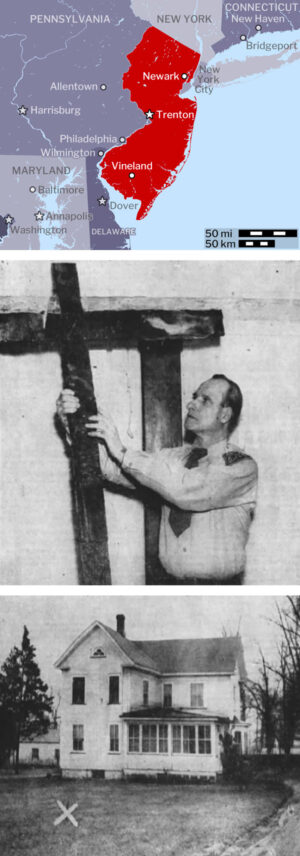 Jan 6: Second large cross burned in New Jersey. A seven-foot (2.1 m) cross is burned on front of the Landis Township, New Jersey, home of Fred Schnell. The Schnells are away visiting friends when at about 9:00 p.m., neighbors see the large cross burning in front of their home, but they don’t call police. When the Schnells return at about 11:30, they see the still-smoldering cross and call police. Like the Cyters, who had a cross burned in front of their home earlier this week, Schnell is also a poultry farmer and native of Germany. The following day, police will arrest four men in connection with the Cyter cross burning: Joseph Abba, 25; John Shaw, 22; Daniel DaTorre, 22; and William Stubee, 19. The four confess to burning the cross at the Cyter home because they wanted to “have a little fun”, but they deny burning a cross at the Schnell residence. Because of the differences between the construction of the two crosses, police believe the second burning is a copycat. Their hunch will prove correct. On Monday, they will arrest seven more, ranging in ages from 15 to 21. The two adults arrested are Harold Gillespie, 21, and Charles McMicking, 20. They will say that they burned the Schnell cross as a “joke”. They will plead guilty to disorderly conduct and fined $20 (about $205 today).
Jan 6: Second large cross burned in New Jersey. A seven-foot (2.1 m) cross is burned on front of the Landis Township, New Jersey, home of Fred Schnell. The Schnells are away visiting friends when at about 9:00 p.m., neighbors see the large cross burning in front of their home, but they don’t call police. When the Schnells return at about 11:30, they see the still-smoldering cross and call police. Like the Cyters, who had a cross burned in front of their home earlier this week, Schnell is also a poultry farmer and native of Germany. The following day, police will arrest four men in connection with the Cyter cross burning: Joseph Abba, 25; John Shaw, 22; Daniel DaTorre, 22; and William Stubee, 19. The four confess to burning the cross at the Cyter home because they wanted to “have a little fun”, but they deny burning a cross at the Schnell residence. Because of the differences between the construction of the two crosses, police believe the second burning is a copycat. Their hunch will prove correct. On Monday, they will arrest seven more, ranging in ages from 15 to 21. The two adults arrested are Harold Gillespie, 21, and Charles McMicking, 20. They will say that they burned the Schnell cross as a “joke”. They will plead guilty to disorderly conduct and fined $20 (about $205 today).
![]() Jan 6: MacArthur tightens press censorship. Military censors at Gen. Douglas MacArthur’s headquarters in Tokyo impose new and more intensive press restrictions. Negative comments in news dispatches about U.N. troops are banned if they describe current operations. “Comments indicating a low morale or poor efficiency on the part of United Nations troops will not be cleared as a violation of security, giving aid and comfort to the enemy.” The list goes on. Dispatches are to contain no mention, of current operations, of unit names or positions, unit nationality, guerrilla action, defense positions or composition.
Jan 6: MacArthur tightens press censorship. Military censors at Gen. Douglas MacArthur’s headquarters in Tokyo impose new and more intensive press restrictions. Negative comments in news dispatches about U.N. troops are banned if they describe current operations. “Comments indicating a low morale or poor efficiency on the part of United Nations troops will not be cleared as a violation of security, giving aid and comfort to the enemy.” The list goes on. Dispatches are to contain no mention, of current operations, of unit names or positions, unit nationality, guerrilla action, defense positions or composition.
▲Sunday, January 7
![]() Jan 7: Taft reiterates opposition to NATO force, calls for withdrawing troops from Korea. Sen. Robert A. Taft (R-OH) appears on NBC’s Meet the Press and says he favors pulling U.S. troops out of Korea and establishing a new Pacific defense line based on Japan and the Nationalist Chinese government in Taiwan. He also warns that if the Soviet Union attacks Western Europe, “it means war.” But he says that the land defense of Western Europe is their responsibility, and that large contingent of U.S. troops should not be sent overseas. He also says that he believes that the creation of a large NATO army under Gen. Dwight D. Eisenhower might provoke the Soviet Union to attack Western Europe. “I hope that the European nations will see fit to defend themselves, but I am not urging them to do it or not to do it. That is their decision. We ought not to be giving them money and things to force them into a position which they don’t keep whole-heartedly. … I would not object to committing some limited number of American divisions to work with them … if it appears as a reasonable chance of success.” He denies that his position is an isolationist one, and says that he advocates establishing a world-wide U.S. sea and air presence as “a bastion of free nations.”
Jan 7: Taft reiterates opposition to NATO force, calls for withdrawing troops from Korea. Sen. Robert A. Taft (R-OH) appears on NBC’s Meet the Press and says he favors pulling U.S. troops out of Korea and establishing a new Pacific defense line based on Japan and the Nationalist Chinese government in Taiwan. He also warns that if the Soviet Union attacks Western Europe, “it means war.” But he says that the land defense of Western Europe is their responsibility, and that large contingent of U.S. troops should not be sent overseas. He also says that he believes that the creation of a large NATO army under Gen. Dwight D. Eisenhower might provoke the Soviet Union to attack Western Europe. “I hope that the European nations will see fit to defend themselves, but I am not urging them to do it or not to do it. That is their decision. We ought not to be giving them money and things to force them into a position which they don’t keep whole-heartedly. … I would not object to committing some limited number of American divisions to work with them … if it appears as a reasonable chance of success.” He denies that his position is an isolationist one, and says that he advocates establishing a world-wide U.S. sea and air presence as “a bastion of free nations.”
▲Monday, January 8
![]() Jan 8: Truman answers calls for retreat from Korea, decreased commitment to Europe. President Harry Truman, in his annual State of the Union Message, calls for increasing current defense production “as fast as possible” and to “increase our capacity to produce and to keep our economy strong for the long pull. We do not know how long Communist aggression will threaten the world.” He says he is willing to negotiate honorable settlements with the Soviet Union, but “we will fight, if fight we must, to keep our freedom and prevent justice from being destroyed.” Truman specifically answers calls from Sen. Robert Taft (R-OH) and former President Herbert Hoover to withdraw from Korea and decrease involvement in Europe. “Indeed, the state of our nation is in great part the state of our friends and allies throughout the world. The gun that points at them points at us also.” He points to Korea as an example, which he says “has tremendous significance for the world” where “free nations, acting through the United Nations, are fighting together against aggression. We will understand the importance of this best if we look back into history. If the democracies had stood up against the invasion of Manchuria in 1931, or the attack on Ethiopia in 1935, or the seizure of Austria in 1938 … the whole history of our time would have been different. The principles for which we are fighting in Korea are right and just. … The free world must always stand for these principles — and we will stand with the free world.”
Jan 8: Truman answers calls for retreat from Korea, decreased commitment to Europe. President Harry Truman, in his annual State of the Union Message, calls for increasing current defense production “as fast as possible” and to “increase our capacity to produce and to keep our economy strong for the long pull. We do not know how long Communist aggression will threaten the world.” He says he is willing to negotiate honorable settlements with the Soviet Union, but “we will fight, if fight we must, to keep our freedom and prevent justice from being destroyed.” Truman specifically answers calls from Sen. Robert Taft (R-OH) and former President Herbert Hoover to withdraw from Korea and decrease involvement in Europe. “Indeed, the state of our nation is in great part the state of our friends and allies throughout the world. The gun that points at them points at us also.” He points to Korea as an example, which he says “has tremendous significance for the world” where “free nations, acting through the United Nations, are fighting together against aggression. We will understand the importance of this best if we look back into history. If the democracies had stood up against the invasion of Manchuria in 1931, or the attack on Ethiopia in 1935, or the seizure of Austria in 1938 … the whole history of our time would have been different. The principles for which we are fighting in Korea are right and just. … The free world must always stand for these principles — and we will stand with the free world.”
![]()
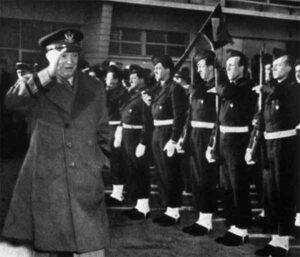 Jan 8: Eisenhower takes up his position as Supreme Commander of NATO. Gen. Dwight D. Eisenhower says he has come to Paris “because the United States believes with the rest of the Western world that we have not only the right but the duty to protect the culture that has been developed in this corner of the globe and spread throughout the world.” Eisenhower warns the Soviet block: “There is power in our union — and resourcefulness on sea, land and air. Aroused and united, there is nothing that the nations of the Atlantic community cannot achieve. Let those who might be tempted to put this power to the test ponder well the lessons of history.”
Jan 8: Eisenhower takes up his position as Supreme Commander of NATO. Gen. Dwight D. Eisenhower says he has come to Paris “because the United States believes with the rest of the Western world that we have not only the right but the duty to protect the culture that has been developed in this corner of the globe and spread throughout the world.” Eisenhower warns the Soviet block: “There is power in our union — and resourcefulness on sea, land and air. Aroused and united, there is nothing that the nations of the Atlantic community cannot achieve. Let those who might be tempted to put this power to the test ponder well the lessons of history.”
▲Tuesday, January 9
![]() Jan 9: The U.S. Eighth Army in Korea clamps down hard with new press restrictions. The new rules threaten ouster or even court-martial for a news correspondent who violates the rules “either in letter or in spirit.” Among the restrictions are a ban on the use of the word “retreat” in connection with the withdrawal of U.N. Forces. The pullback, according to officials, is a planned an orderly withdrawal, not a retreat. Also, information that would “injure the morale of our forces, of our allies” or that would “embarrass the United States, its allies or neutral countries” are also banned.
Jan 9: The U.S. Eighth Army in Korea clamps down hard with new press restrictions. The new rules threaten ouster or even court-martial for a news correspondent who violates the rules “either in letter or in spirit.” Among the restrictions are a ban on the use of the word “retreat” in connection with the withdrawal of U.N. Forces. The pullback, according to officials, is a planned an orderly withdrawal, not a retreat. Also, information that would “injure the morale of our forces, of our allies” or that would “embarrass the United States, its allies or neutral countries” are also banned.
▲Wednesday, January 10
![]() Jan 10: American author and Nobel Prize winner Sinclair Lewis dies of complications from alcoholism at the age of 65.
Jan 10: American author and Nobel Prize winner Sinclair Lewis dies of complications from alcoholism at the age of 65.
▲Thursday, January 11
![]()
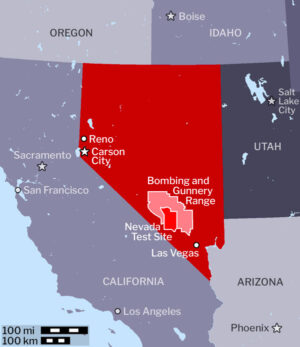 Jan 11: Atomic Energy Commission announces nuclear test site in Nevada. The Atomic Energy Commission announces that 5,000 square miles (13,000 sq km) in Nevada will be set aside as an atomic weapons test site. The Nevada Test Site will be carved out of the Air Force’s Bombing and Gunnery Range northwest of Las Vegas. Testing of nuclear weapons will continue at Eniwetok Atoll in the Marshall Islands. But, the commission explains: “The use of the Las Vegas Bombing and Gunnery Range will make available to the Los Alamos Scientific Laboratory a readily accessible site for periodic test work with a resultant speed-up in the weapons development program. Test activities at the new site will include experimental nuclear detonation(s)… carried out under controlled conditions.” The AEC reassures the public that “radiological safety and security conditions incident to the type of test to be undertaken have been carefully reviewed by authorities in the fields involved. It has been found that the tests may be conducted with adequate assurance of safety under the conditions prevailing at the bombing reservation.” Nevada Gov. Charles H. Russell (R) says he has been assured that “there is no element of danger in this project. The program will be as safe as was the explosion of the first atomic bomb at Alamogordo. Despite that, every known precaution will be taken. … The state of Nevada is proud to have been selected as the scene of such a key product.”
Jan 11: Atomic Energy Commission announces nuclear test site in Nevada. The Atomic Energy Commission announces that 5,000 square miles (13,000 sq km) in Nevada will be set aside as an atomic weapons test site. The Nevada Test Site will be carved out of the Air Force’s Bombing and Gunnery Range northwest of Las Vegas. Testing of nuclear weapons will continue at Eniwetok Atoll in the Marshall Islands. But, the commission explains: “The use of the Las Vegas Bombing and Gunnery Range will make available to the Los Alamos Scientific Laboratory a readily accessible site for periodic test work with a resultant speed-up in the weapons development program. Test activities at the new site will include experimental nuclear detonation(s)… carried out under controlled conditions.” The AEC reassures the public that “radiological safety and security conditions incident to the type of test to be undertaken have been carefully reviewed by authorities in the fields involved. It has been found that the tests may be conducted with adequate assurance of safety under the conditions prevailing at the bombing reservation.” Nevada Gov. Charles H. Russell (R) says he has been assured that “there is no element of danger in this project. The program will be as safe as was the explosion of the first atomic bomb at Alamogordo. Despite that, every known precaution will be taken. … The state of Nevada is proud to have been selected as the scene of such a key product.”
▲Friday, January 12
![]()
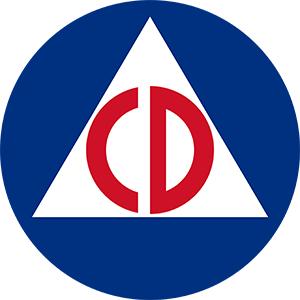 Jan 12: Truman signs the Federal Civil Defense Act of 1950. The new law formally authorizes the newly-established Federal Civil Defense Administration (FCDA) to create shelter, evacuation and training programs for state and local governments to implement. The Act also allows local governments to request matching federal funds to build fallout shelters, erect air-raid sirens, and implement evacuation plans. The total program is estimated to cost about $3.1 billion (about $31.6 billion today), although Congress has yet to come up with any meaningful appropriations to fund the ambitious program. Subsequent legislation over the next decade will provide minimal resources, leaving the FCDA to focus mainly on producing films, pamphlets, and other educational materials on how to survive a nuclear war. The bulk of the nation’s civil defense work will be carried out at the state and local level.
Jan 12: Truman signs the Federal Civil Defense Act of 1950. The new law formally authorizes the newly-established Federal Civil Defense Administration (FCDA) to create shelter, evacuation and training programs for state and local governments to implement. The Act also allows local governments to request matching federal funds to build fallout shelters, erect air-raid sirens, and implement evacuation plans. The total program is estimated to cost about $3.1 billion (about $31.6 billion today), although Congress has yet to come up with any meaningful appropriations to fund the ambitious program. Subsequent legislation over the next decade will provide minimal resources, leaving the FCDA to focus mainly on producing films, pamphlets, and other educational materials on how to survive a nuclear war. The bulk of the nation’s civil defense work will be carried out at the state and local level.
▲Saturday, January 13
![]()
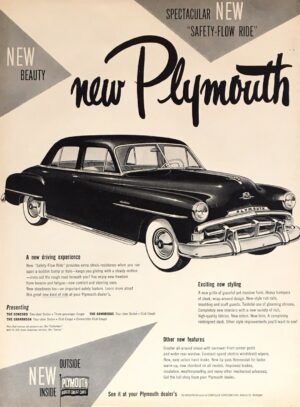 Jan 13: New Plymouths arrive in dealer showrooms. The Plymouth Division of Chrysler Corporation debuts three new models. Gone are the two Deluxe models and the Special Deluxe. Taking their places are the Concord, Cambridge, and Cranbrook. In reality, these three new models aren’t new at all. They’re just the old models with new badges and a few design tweaks here and there. They’re still as stodgy and old-fashioned as ever. They even still retain split windshields while just about everyone else has moved to a single sheet of glass. And while other automakers are going for lower and sleeker styles, Plymouths remain tall and upright. Chrysler president K.T. Keller wanted his cars tall enough so drivers can drive them while wearing a hat. Plymouth buyers finally get electric windshield wipers, but automatic transmissions are still off the options list. Prices for the entry-level Concord two-door start at $1,622 (about $16,600 today). The Cranbrook, which is actually just a Cambridge in better trim, is $1,759 (about $18,000 today) for a four-door sedan.
Jan 13: New Plymouths arrive in dealer showrooms. The Plymouth Division of Chrysler Corporation debuts three new models. Gone are the two Deluxe models and the Special Deluxe. Taking their places are the Concord, Cambridge, and Cranbrook. In reality, these three new models aren’t new at all. They’re just the old models with new badges and a few design tweaks here and there. They’re still as stodgy and old-fashioned as ever. They even still retain split windshields while just about everyone else has moved to a single sheet of glass. And while other automakers are going for lower and sleeker styles, Plymouths remain tall and upright. Chrysler president K.T. Keller wanted his cars tall enough so drivers can drive them while wearing a hat. Plymouth buyers finally get electric windshield wipers, but automatic transmissions are still off the options list. Prices for the entry-level Concord two-door start at $1,622 (about $16,600 today). The Cranbrook, which is actually just a Cambridge in better trim, is $1,759 (about $18,000 today) for a four-door sedan.
▲Sunday, January 14
![]()
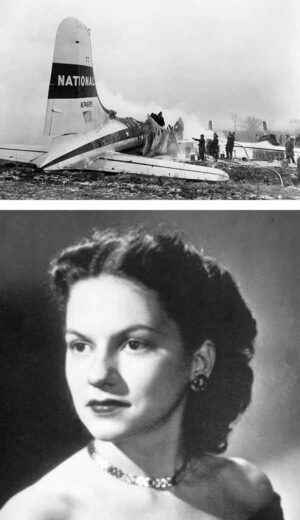 Jan 14: Airline crash in Philadelphia kills 7. A National Airlines flight from Newark, New Jersey to Norfolk, Virginia crashes while landing for a scheduled stop at Philadelphia International Airport. The DC-4 carrying 25 passengers and three crewmembers try to land the aircraft too far down the runway instead of aborting and flying around. The runway is icy, and the aircraft overshoots the end of the runway, crashes through a fence and into a ditch. The left wing breaks off, rupturing the fuel tanks and igniting a fire. Mary Frances “Frankie” Housley, 24, is the lone flight attendant. She opens the emergency door and helps passengers escape, giving some a gentle shove when they hesitate to jump the eight feet (2⅔ m) to the ground. After seeing several passengers to safety, she returns to the cabin to try to rescue a baby. She never makes it out. After the fire is extinguished, rescuers fined the bodies of five women and two infants. Among them are Housely with a four-month-old infant in her arms in the aisle near the door. The child’s mother and younger sister had already been rescued. Altogether, nineteen passengers survive, including the captain and copilot.
Jan 14: Airline crash in Philadelphia kills 7. A National Airlines flight from Newark, New Jersey to Norfolk, Virginia crashes while landing for a scheduled stop at Philadelphia International Airport. The DC-4 carrying 25 passengers and three crewmembers try to land the aircraft too far down the runway instead of aborting and flying around. The runway is icy, and the aircraft overshoots the end of the runway, crashes through a fence and into a ditch. The left wing breaks off, rupturing the fuel tanks and igniting a fire. Mary Frances “Frankie” Housley, 24, is the lone flight attendant. She opens the emergency door and helps passengers escape, giving some a gentle shove when they hesitate to jump the eight feet (2⅔ m) to the ground. After seeing several passengers to safety, she returns to the cabin to try to rescue a baby. She never makes it out. After the fire is extinguished, rescuers fined the bodies of five women and two infants. Among them are Housely with a four-month-old infant in her arms in the aisle near the door. The child’s mother and younger sister had already been rescued. Altogether, nineteen passengers survive, including the captain and copilot.
▲Monday, January 15
![]() Jan 15: Taft calls Truman’s conduct of undeclared war a “constitutional crisis.”Senate Republican leader Robert A. Taft (R-OH) makes these statements at a dinner in New York City. “The people of this country face today a constitutional crisis affecting the whole basis of government in the United States and the liberty of the people themselves. The effect of the President’s claim that he can agree with foreign nations to commit American soldiers to an international force in any number and any place in the world without Congressional authority is to eliminate Congress and the people themselves for all practical purposes from any part in the decision of foreign policies and the making of war and peace.” Taft also denounces Administration plans to send American troops to Europe as part of a build-up of NATO forces. “The President is proposing to commit a certain number of American divisions to the command of an international commander selected not by him as Commander in Chief of the American Army but by a group of nations. At the moment they may choose General Eisenhower. Tomorrow they may choose a British or French commanding general. The undertaking proposed is far greater than that proposed under the United Nations Charter and much more likely to produce war.”
Jan 15: Taft calls Truman’s conduct of undeclared war a “constitutional crisis.”Senate Republican leader Robert A. Taft (R-OH) makes these statements at a dinner in New York City. “The people of this country face today a constitutional crisis affecting the whole basis of government in the United States and the liberty of the people themselves. The effect of the President’s claim that he can agree with foreign nations to commit American soldiers to an international force in any number and any place in the world without Congressional authority is to eliminate Congress and the people themselves for all practical purposes from any part in the decision of foreign policies and the making of war and peace.” Taft also denounces Administration plans to send American troops to Europe as part of a build-up of NATO forces. “The President is proposing to commit a certain number of American divisions to the command of an international commander selected not by him as Commander in Chief of the American Army but by a group of nations. At the moment they may choose General Eisenhower. Tomorrow they may choose a British or French commanding general. The undertaking proposed is far greater than that proposed under the United Nations Charter and much more likely to produce war.”
▲Tuesday, January 16
![]()
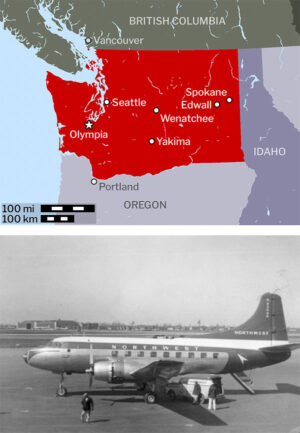 Jan 16: Northwest Airlines flight crashes near Spokane, killing 10. The Martin 2-0-2 aircraft is en route from Minneapolis to Seattle, with a half dozen scheduled stops along the way. It arrives at Spokane at 11:22 a.m., fifty-two minutes late, thanks to headwinds and other delays. After a quick aircraft check, it takes off shortly after noon and heads for its next stop at Wenatchee. From there it is to go to Yakima and then Seattle. About ten minutes after leaving Spokane, the tower warns of bad weather at Wenatchee. The pilot asks permission to go on to Yakima. While those arrangements are being made, the pilot broadcasts a brief emergency message saying the plane was in trouble and going down. At a small farm near Edwall, Loring E. Bundy and his wife, Beverly Ann, are sitting down to lunch with their two children when they hear a loud roar of aircraft engines followed by a loud explosion. Bundy tells his wife to phone a nearby air force base while he goes outside to investigate. In high winds and blowing snow, Bundy approaches the smoldering wreckage about 100 yards (100 m) from the farmhouse. “I could see there was nothing I could do. There wasn’t even much fire, except for a few little scattered bonfires. Then I ran up onto a hill nearby to see if anyone had bailed out. Then I came back because the sight made me sick” All ten on board, including three crew members, are killed. The impact obliterated all evidence of possible aircraft failure and no specific cause of the crash is ever determined. Since August 1948, there have been five accidents killing 89 people in Northwest Airlines Martin 2-0-2s. With this accident, Northwest Airlines pilots lose confidence in the 2-0-2s and refuse to fly them. Two months later, Northwest will withdraw all of their Martin 2-0-2s from service and replace them with Douglas DC-4s.
Jan 16: Northwest Airlines flight crashes near Spokane, killing 10. The Martin 2-0-2 aircraft is en route from Minneapolis to Seattle, with a half dozen scheduled stops along the way. It arrives at Spokane at 11:22 a.m., fifty-two minutes late, thanks to headwinds and other delays. After a quick aircraft check, it takes off shortly after noon and heads for its next stop at Wenatchee. From there it is to go to Yakima and then Seattle. About ten minutes after leaving Spokane, the tower warns of bad weather at Wenatchee. The pilot asks permission to go on to Yakima. While those arrangements are being made, the pilot broadcasts a brief emergency message saying the plane was in trouble and going down. At a small farm near Edwall, Loring E. Bundy and his wife, Beverly Ann, are sitting down to lunch with their two children when they hear a loud roar of aircraft engines followed by a loud explosion. Bundy tells his wife to phone a nearby air force base while he goes outside to investigate. In high winds and blowing snow, Bundy approaches the smoldering wreckage about 100 yards (100 m) from the farmhouse. “I could see there was nothing I could do. There wasn’t even much fire, except for a few little scattered bonfires. Then I ran up onto a hill nearby to see if anyone had bailed out. Then I came back because the sight made me sick” All ten on board, including three crew members, are killed. The impact obliterated all evidence of possible aircraft failure and no specific cause of the crash is ever determined. Since August 1948, there have been five accidents killing 89 people in Northwest Airlines Martin 2-0-2s. With this accident, Northwest Airlines pilots lose confidence in the 2-0-2s and refuse to fly them. Two months later, Northwest will withdraw all of their Martin 2-0-2s from service and replace them with Douglas DC-4s.
![]() Jan 16: Feds move to curb inflation. A sharp jump in inflation due to the Korean conflict leads the U.S. government to begin imposing controls on construction material to ensure adequate materials for the war effort. The Federal Reserve Board orders a margin increase for stock trades from 50% to 75% as a curb on inflation.
Jan 16: Feds move to curb inflation. A sharp jump in inflation due to the Korean conflict leads the U.S. government to begin imposing controls on construction material to ensure adequate materials for the war effort. The Federal Reserve Board orders a margin increase for stock trades from 50% to 75% as a curb on inflation.
▲Wednesday, January 17
 Jan 17: Klan flogs disabled farmer and disabled vet. Sam Gore, 49, who was left disabled by a car accident in 1942, and J.C. Gore, 25 and a disabled veteran of World War II, are taken from their home near Conway, South Carolina, by hooded and robed Klansmen. They are brought to the El Dorado schoolyard northwest of Conway, where both are severely whipped and beaten. The Gores say that a mob of 25 robed and hooded Klansmen are present during the beating. The Klansmen say the Gores were “drinking too much.” Horry County sheriff C.E. Sasser announces four arrests two days later. Arrested are Harvey Johnson,, a hardware store owner; D.E. Guyton, soft drink salesman; Almond Chestnut, a farmer; and Jack Causey, a mechanic. The younger Gore works for the same employer as Guyon. Sasser will arrest three more on Saturday: Dr. A.J. Gore, a Conway eye doctor; Clyde Creel, a service station operator and secretary-treasurer of the Horry County Klan organization; and Kermit Todd, a farmer. News reports say that the night before the floggings, some seventy-five Klansmen held a meeting at North Myrtne Beach. Horry County has been a hotbed of KKK activity in recent months. Last August, a policeman wearing a Klan robe over his uniform was killed during a shooting at an African-American nightclub in Myrtle Beach. In November, a bedridden farmer and two sons were beaten by Klansmen. That same month, the Klan held a mass rally just north of Conway.
Jan 17: Klan flogs disabled farmer and disabled vet. Sam Gore, 49, who was left disabled by a car accident in 1942, and J.C. Gore, 25 and a disabled veteran of World War II, are taken from their home near Conway, South Carolina, by hooded and robed Klansmen. They are brought to the El Dorado schoolyard northwest of Conway, where both are severely whipped and beaten. The Gores say that a mob of 25 robed and hooded Klansmen are present during the beating. The Klansmen say the Gores were “drinking too much.” Horry County sheriff C.E. Sasser announces four arrests two days later. Arrested are Harvey Johnson,, a hardware store owner; D.E. Guyton, soft drink salesman; Almond Chestnut, a farmer; and Jack Causey, a mechanic. The younger Gore works for the same employer as Guyon. Sasser will arrest three more on Saturday: Dr. A.J. Gore, a Conway eye doctor; Clyde Creel, a service station operator and secretary-treasurer of the Horry County Klan organization; and Kermit Todd, a farmer. News reports say that the night before the floggings, some seventy-five Klansmen held a meeting at North Myrtne Beach. Horry County has been a hotbed of KKK activity in recent months. Last August, a policeman wearing a Klan robe over his uniform was killed during a shooting at an African-American nightclub in Myrtle Beach. In November, a bedridden farmer and two sons were beaten by Klansmen. That same month, the Klan held a mass rally just north of Conway.▲Thursday, January 18
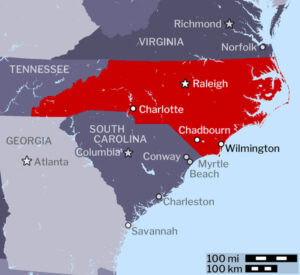 Jan 18: Suspected Klansmen beat Black woman in North Carolina. The mob that shows up a the home of Willie and Evergreen Flowers, near Broadway road two miles west of Chadbourn, North Carolina, is dressed in regular street clothes. But Sheriff H. High Nance says that there is considerable reason to believe that the mob is part of the KKK group that has been operating across the state line at Conway, South Carolina. The couple and their ten-year-old daughter are asleep when eight to ten cars arrive at 11:30 p.m. Willie rushes to a back room to get his shotgun, but he can’t find any shells. When the mob fires several shots at the house, he runs out the back door to go to his brother’s house for help. The mob takes Evergreen outside and beats her with sticks and a gun butt before leaving. White residents in the area say they saw the cars leaving east toward Grice, but nobody recognizes anyone in the vehicles.
Jan 18: Suspected Klansmen beat Black woman in North Carolina. The mob that shows up a the home of Willie and Evergreen Flowers, near Broadway road two miles west of Chadbourn, North Carolina, is dressed in regular street clothes. But Sheriff H. High Nance says that there is considerable reason to believe that the mob is part of the KKK group that has been operating across the state line at Conway, South Carolina. The couple and their ten-year-old daughter are asleep when eight to ten cars arrive at 11:30 p.m. Willie rushes to a back room to get his shotgun, but he can’t find any shells. When the mob fires several shots at the house, he runs out the back door to go to his brother’s house for help. The mob takes Evergreen outside and beats her with sticks and a gun butt before leaving. White residents in the area say they saw the cars leaving east toward Grice, but nobody recognizes anyone in the vehicles.▲Friday, January 19
▲Saturday, January 20
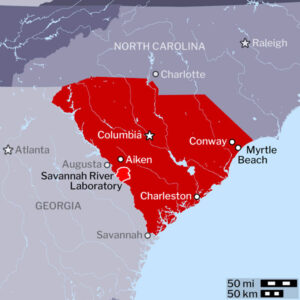 Jan 20: Klan blames floggings on “New York racketeers” and Negroes. Thomas Hamilton, Grand Dragon of the Carolina Klans, and Bill Hendrix, Grand Dragon of the Association of Florida Klans, speak in front of about 350 unmasked and unrobed KLansmen at Aiken, South Carolina. The meeting takes place just a few miles from the announced Savannah River Laboratory site, where the NAACP has called on the Federal Government to ensure that African-Americans are afforded equal employment and housing opportunities. Tonight’s meeting in front of a fiery cross is believed to be the first public Klan gathering where members wear ordinary street clothes. Hendrix claims that he had never been in favor of wearing masks except in Klan ritual, and claims that Negroes and others who want to discredit the Klan have appropriated its regalia for terroristic activities. Both men blame recent violence in Conway on “New York racketeers” and Horry County sheriff C.E. Sasser. Says Hemdrix, “It seems that every time we are about to hold a meeting, the officials in Horry County see to it that somebody gets beet up.” Both men call on the U.S. to withdraw from the “Jewish-dominated” United Nations, and allege that Jews have dominated both the Roosevelt and Truman Administrations.
Jan 20: Klan blames floggings on “New York racketeers” and Negroes. Thomas Hamilton, Grand Dragon of the Carolina Klans, and Bill Hendrix, Grand Dragon of the Association of Florida Klans, speak in front of about 350 unmasked and unrobed KLansmen at Aiken, South Carolina. The meeting takes place just a few miles from the announced Savannah River Laboratory site, where the NAACP has called on the Federal Government to ensure that African-Americans are afforded equal employment and housing opportunities. Tonight’s meeting in front of a fiery cross is believed to be the first public Klan gathering where members wear ordinary street clothes. Hendrix claims that he had never been in favor of wearing masks except in Klan ritual, and claims that Negroes and others who want to discredit the Klan have appropriated its regalia for terroristic activities. Both men blame recent violence in Conway on “New York racketeers” and Horry County sheriff C.E. Sasser. Says Hemdrix, “It seems that every time we are about to hold a meeting, the officials in Horry County see to it that somebody gets beet up.” Both men call on the U.S. to withdraw from the “Jewish-dominated” United Nations, and allege that Jews have dominated both the Roosevelt and Truman Administrations.▲Sunday, January 21
![]()
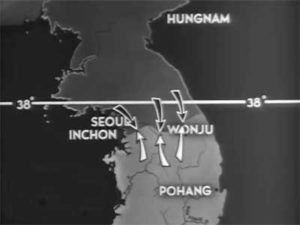 Jan 21: North Korean and Chinese troops push U.N. forces out of Inchon after a fierce twelve-hour battle.
Jan 21: North Korean and Chinese troops push U.N. forces out of Inchon after a fierce twelve-hour battle.
▲Monday, January 22
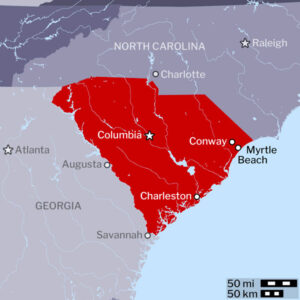 Jan 22: Conway Sheriff announces anti-Klan drive. Horry County, South Carolina Sheriff C.E. Sasser responds to accusations made at Saturday’s rally in Aiken with an announcement that he is launching an all-out battle against the KKK. Sasser says that he is deputizing citizens “in every precinct of the county” to act against “Klan disorders.” Says Sasser, “Many leading citizens of the county have called in and offered their help to clear up the Klan situation.” He also says that, if it becomes necessary, he is prepared to ask Gov. James F. Byrnes (D) to send state troops into the county. Sasser also discloses that Sam Gore, the forty-nine-year-old disabled farmer who was severely flogged and beaten by the Klan last week, was threatened again again yesterday. Three men warned Gore against testifying against the seven men arrested in the case. “Every time they violate the law,” warns Sasser, “I’m going to put them in jail — regardless of what it takes.”
Jan 22: Conway Sheriff announces anti-Klan drive. Horry County, South Carolina Sheriff C.E. Sasser responds to accusations made at Saturday’s rally in Aiken with an announcement that he is launching an all-out battle against the KKK. Sasser says that he is deputizing citizens “in every precinct of the county” to act against “Klan disorders.” Says Sasser, “Many leading citizens of the county have called in and offered their help to clear up the Klan situation.” He also says that, if it becomes necessary, he is prepared to ask Gov. James F. Byrnes (D) to send state troops into the county. Sasser also discloses that Sam Gore, the forty-nine-year-old disabled farmer who was severely flogged and beaten by the Klan last week, was threatened again again yesterday. Three men warned Gore against testifying against the seven men arrested in the case. “Every time they violate the law,” warns Sasser, “I’m going to put them in jail — regardless of what it takes.”▲Tuesday, January 23
▲Wednesday, January 24
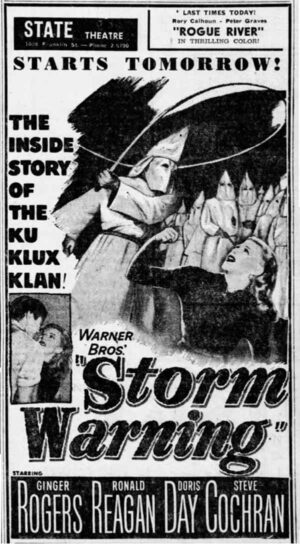 Jan 24: Klan leaves tracts at Tampa theater. Warner Brothers made a big to-do a week ago over the premiere of their anti-Klan film, Storm Warning in Miami Beach. Starring Ginger Rogers, Ronald Reagan, Doris Day, and Steve Cochran, Warner’s timid little social conscience film somehow manages to portray the Klan in a bad light without even remotely touching on racism. The only person who is killed is a white reporter from out of town, killed because he’s making the town “look bad.” And the only person threatened is a white woman in town visiting her sister and who happens to see the murder. The New York Times says Storm Warning is a “mechanically melodramatic film, superficially forceful but lacking in substance or depth.” The KKK also isn’t impressed with the film. Patrons of the State Theater in Tampa find pamphlets let in the rest rooms and stacked out front denouncing Hollywood as a hotbed of Communism. The pamphlets don’t mention Storm Warning by name, but they describe Hollywood as a “Red capital” and says that the Klan will begin picketing “Red slanted” releases. The Klan gives its blessing to Clark Gable, Abbott and Costello, Edgar Bergen, Gene Autry, and “many more.” They denounce Hollywood “reds”, naming “Charlie Chaplin, Fredric March, Humphrey Bogart, John Garfield, Eddie Cantor, Bette Davis, Douglas Fairbanks, Jr., Katharine Hepburn, Groucho Marx, and Edward G. Robinson. The pamphlets say that any “native-born white Protestant Christian” who wants to “join the Klan and fight Communism and Communist Front organizations effectively” should write to a Tampa post office box.
Jan 24: Klan leaves tracts at Tampa theater. Warner Brothers made a big to-do a week ago over the premiere of their anti-Klan film, Storm Warning in Miami Beach. Starring Ginger Rogers, Ronald Reagan, Doris Day, and Steve Cochran, Warner’s timid little social conscience film somehow manages to portray the Klan in a bad light without even remotely touching on racism. The only person who is killed is a white reporter from out of town, killed because he’s making the town “look bad.” And the only person threatened is a white woman in town visiting her sister and who happens to see the murder. The New York Times says Storm Warning is a “mechanically melodramatic film, superficially forceful but lacking in substance or depth.” The KKK also isn’t impressed with the film. Patrons of the State Theater in Tampa find pamphlets let in the rest rooms and stacked out front denouncing Hollywood as a hotbed of Communism. The pamphlets don’t mention Storm Warning by name, but they describe Hollywood as a “Red capital” and says that the Klan will begin picketing “Red slanted” releases. The Klan gives its blessing to Clark Gable, Abbott and Costello, Edgar Bergen, Gene Autry, and “many more.” They denounce Hollywood “reds”, naming “Charlie Chaplin, Fredric March, Humphrey Bogart, John Garfield, Eddie Cantor, Bette Davis, Douglas Fairbanks, Jr., Katharine Hepburn, Groucho Marx, and Edward G. Robinson. The pamphlets say that any “native-born white Protestant Christian” who wants to “join the Klan and fight Communism and Communist Front organizations effectively” should write to a Tampa post office box.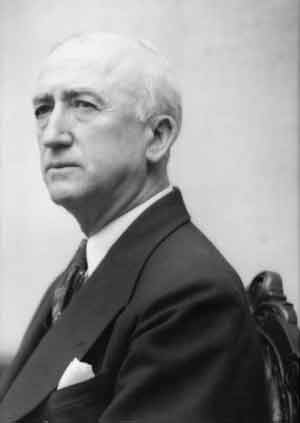 Jan 24: South Carolina governor says end of segregation is not imminent. Gov. James F. Byrnes (D) addresses a joint meeting of the General Assembly to ask for a $75 million school construction bond issue. He reassures the legislature that “we need have no fear that segregation in the state’s public schools will be abolished. … We will find a lawful way of educating all of South Carolina’s children, and at the same time providing separate schools for the races. The politicians in Washington and the Negro agitators in South Carolina who today seek to abolish segregation in all schools will learn that what a carpet bag government could not do in the Reconstruction period, cannot be done in this period. And the white people of South Carolina will see to it that innocent colored children will not be denied an education because of selfish politicians and misguided agitators.” Byrnes acknowledges that some would oppose the bond issue in fear that a lawsuit filed against a Clarendon County school district last month seeking to abolish segregation may succeed. “This argument is not sound,” he says. “Our school buildings will not be wasted. The overwhelming majority of colored people in this state do not want to force their children into white schools. Just as the Negro preachers do not want their congregations to leave them and attend the churches of the white people, the Negro teachers do not want their pupils to leave them and attend schools for white children.”
Jan 24: South Carolina governor says end of segregation is not imminent. Gov. James F. Byrnes (D) addresses a joint meeting of the General Assembly to ask for a $75 million school construction bond issue. He reassures the legislature that “we need have no fear that segregation in the state’s public schools will be abolished. … We will find a lawful way of educating all of South Carolina’s children, and at the same time providing separate schools for the races. The politicians in Washington and the Negro agitators in South Carolina who today seek to abolish segregation in all schools will learn that what a carpet bag government could not do in the Reconstruction period, cannot be done in this period. And the white people of South Carolina will see to it that innocent colored children will not be denied an education because of selfish politicians and misguided agitators.” Byrnes acknowledges that some would oppose the bond issue in fear that a lawsuit filed against a Clarendon County school district last month seeking to abolish segregation may succeed. “This argument is not sound,” he says. “Our school buildings will not be wasted. The overwhelming majority of colored people in this state do not want to force their children into white schools. Just as the Negro preachers do not want their congregations to leave them and attend the churches of the white people, the Negro teachers do not want their pupils to leave them and attend schools for white children.”![]() Jan 24: U.N. forces counterattack and retake Wonju. Chinese and North Korean forces are pushed five miles to the north in the largest allied push since the fall of Seoul.
Jan 24: U.N. forces counterattack and retake Wonju. Chinese and North Korean forces are pushed five miles to the north in the largest allied push since the fall of Seoul.
![]() Jan 24: Initial explosion take place at Nevada Test Range. The Atomic Energy Commission won’t make an official announcement until two days later. Even then, the AEC won’t describe the nature of the detonation except to say that it was “a dry run” to test communications and other facilities a the test site. The AEC says the test is a “complete success” and that full-scale operations will begin “within two or three weeks.” The AEC says the tests “will not be visible or audible, except under certain weather conditions.”
Jan 24: Initial explosion take place at Nevada Test Range. The Atomic Energy Commission won’t make an official announcement until two days later. Even then, the AEC won’t describe the nature of the detonation except to say that it was “a dry run” to test communications and other facilities a the test site. The AEC says the test is a “complete success” and that full-scale operations will begin “within two or three weeks.” The AEC says the tests “will not be visible or audible, except under certain weather conditions.”
▲Thursday, January 25
![]()
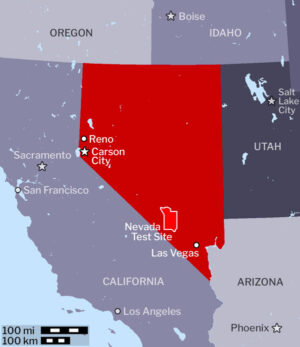 Jan 25: AEC warns Nevada residents about nuclear tests. The Atomic Energy Commission issues a special warning to all residents of southern Nevada and parts of California. The AEC warns: “For national security reasons, there will be no public announcement prior to any nuclear detonation tests. Unauthorized persons who pass within the limits of the range may be subject to injury from, or as a result of, test activities. We can not guarantee the safety of such unauthorized persons who enter on the range or who fly above it.” The AEC says that “every possible efforts” is being made to clear the area of all people and livestock. The AEC says they are especially worried about prospectors, rangers, or private aircraft pilots, especially those engaged in ranching operations, who may stray onto the test site. “No such assurance (of safety) can be extended to unauthorized persons whose movements cannot be controlled.”
Jan 25: AEC warns Nevada residents about nuclear tests. The Atomic Energy Commission issues a special warning to all residents of southern Nevada and parts of California. The AEC warns: “For national security reasons, there will be no public announcement prior to any nuclear detonation tests. Unauthorized persons who pass within the limits of the range may be subject to injury from, or as a result of, test activities. We can not guarantee the safety of such unauthorized persons who enter on the range or who fly above it.” The AEC says that “every possible efforts” is being made to clear the area of all people and livestock. The AEC says they are especially worried about prospectors, rangers, or private aircraft pilots, especially those engaged in ranching operations, who may stray onto the test site. “No such assurance (of safety) can be extended to unauthorized persons whose movements cannot be controlled.”
▲Friday, January 26
Australia Day
![]() Jan 26: Federal government imposes emergency wage freeze. In response to growing inflation and material shortages due to the Korean War, the Office of Economic Stabilization orders an across-the-board freez on wages, salaries and other compensation of employees. The rates are frozen at the level in effect as of yesterday, and they cannot be increased without special approval by the Wage Stabilization Board. The order even affects wage increases already negotiated by not in effect yet. Violatoins are punishable under the Defense Production Act, with penalties up to a year’s imprisonment and/or a fine of up to $10,000 (about $102,000 today). This order comes after the OES imposed price controls on hundreds of consumer goods.
Jan 26: Federal government imposes emergency wage freeze. In response to growing inflation and material shortages due to the Korean War, the Office of Economic Stabilization orders an across-the-board freez on wages, salaries and other compensation of employees. The rates are frozen at the level in effect as of yesterday, and they cannot be increased without special approval by the Wage Stabilization Board. The order even affects wage increases already negotiated by not in effect yet. Violatoins are punishable under the Defense Production Act, with penalties up to a year’s imprisonment and/or a fine of up to $10,000 (about $102,000 today). This order comes after the OES imposed price controls on hundreds of consumer goods.
▲Saturday, January 27
![]()
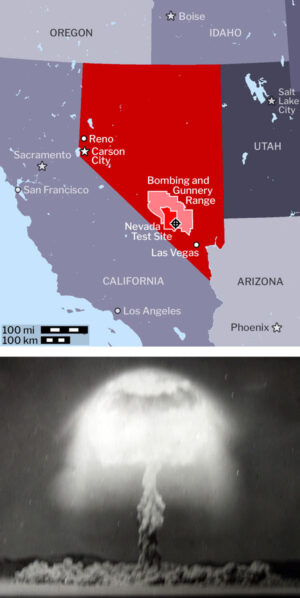 Jan 27: Nuclear testing begins at the Nevada Test Site. The detonation of a 1-kiloton bomb marks the first nuclear explosion to take place in the U.S. since the 1945 Trinity test in New Mexico. The 5:45 a.m. blast is seen, heard, and felt in Las Vegas, fifty miles away. “It really lit up the sky like a big sunburst,” says one resident. Most residents, however, are sleeping, and jarred awake believing a plane had crashed, a car had rammed into their home, or that burglars are breaking in. The Las Vegas police switchboard is flooded with calls for twenty minutes. But for the most part, once everyone figured out that it was an atomic explosion, their alarm vanishes. “You wouldn’t exactly say they were blasé about it today,” says one resident. “It’s the main topic of conversation, but there isn’t any panic or anything like that.” A bus driver coming up from Los Angeles says, “There wasn’t a thing on the road when suddenly the whole western sky lit up. It scared the dickens out of me…. Then I realized it was an A-bomb and kept right on coming.” The Civil Defense Administration, which had not been notified in advance, says that the radiation should have dissipated before reaching Las Vegas. He adds, “If they are not spent in all that distance, then God help us all.”
Jan 27: Nuclear testing begins at the Nevada Test Site. The detonation of a 1-kiloton bomb marks the first nuclear explosion to take place in the U.S. since the 1945 Trinity test in New Mexico. The 5:45 a.m. blast is seen, heard, and felt in Las Vegas, fifty miles away. “It really lit up the sky like a big sunburst,” says one resident. Most residents, however, are sleeping, and jarred awake believing a plane had crashed, a car had rammed into their home, or that burglars are breaking in. The Las Vegas police switchboard is flooded with calls for twenty minutes. But for the most part, once everyone figured out that it was an atomic explosion, their alarm vanishes. “You wouldn’t exactly say they were blasé about it today,” says one resident. “It’s the main topic of conversation, but there isn’t any panic or anything like that.” A bus driver coming up from Los Angeles says, “There wasn’t a thing on the road when suddenly the whole western sky lit up. It scared the dickens out of me…. Then I realized it was an A-bomb and kept right on coming.” The Civil Defense Administration, which had not been notified in advance, says that the radiation should have dissipated before reaching Las Vegas. He adds, “If they are not spent in all that distance, then God help us all.”
▲Sunday, January 28
![]()
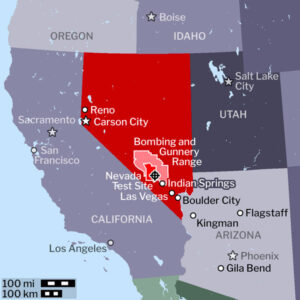 Jan 28: Second atomic blast in Nevada jolts wider area. The 8-kiloton blast, at 5:50 a.m. local time, is considerably larger than yesterday’s detonation. Mildred Drendel, in Reno, is taking a taxi to the airport when “all of the sudden the sky was brilliantly illuminated. It’s really hard to describe,” she says. “I was just so speechless at the time.” A bus driver and passengers see the flash of light in Gila Bend, Arizona, 325 miles (525 km) away. In Flagstaff, 270 miles (435 km) away, Robert A. Shirley is rocking his month-old son back to sleep when he sees a flash that “looked like a great big camera flash” lighting up the sky, followed about ten minutes later by a “dull thud” of the explosion. In Kingman, 155 miles (250 km) from the blast site, residents see a bright light, followed by a vivid red reflection. Nine minutes later, they hear the blast. In Boulder City, 85 miles (160 km) from the detonation site, the flash is bright enough to momentarily light up whole rooms. In many parts of Las Vegas, people reported a blast of wind following the flash. Indian Springs, Nevada, is just 25 miles (40 km) from the blast site. Residents there are treated to a ringside seat. J.E. Rarick, a service station operator, says that workmen had tipped him off. “They told us, ‘if you happen to be up at 6 o’clock, don’t look in that direction.’ The flash is bad for your eyes, you know.” He says that residents are “quite trilled” with the spectacle. Tonight, Pentagon sources disclose that a new atomic bomb test “rivaling the original test at Alamagordo, New Mexico, in 1945” is scheduled to be held in the middle of the week. They say Navy Secretary Francis P. Matthews will witness the test.
Jan 28: Second atomic blast in Nevada jolts wider area. The 8-kiloton blast, at 5:50 a.m. local time, is considerably larger than yesterday’s detonation. Mildred Drendel, in Reno, is taking a taxi to the airport when “all of the sudden the sky was brilliantly illuminated. It’s really hard to describe,” she says. “I was just so speechless at the time.” A bus driver and passengers see the flash of light in Gila Bend, Arizona, 325 miles (525 km) away. In Flagstaff, 270 miles (435 km) away, Robert A. Shirley is rocking his month-old son back to sleep when he sees a flash that “looked like a great big camera flash” lighting up the sky, followed about ten minutes later by a “dull thud” of the explosion. In Kingman, 155 miles (250 km) from the blast site, residents see a bright light, followed by a vivid red reflection. Nine minutes later, they hear the blast. In Boulder City, 85 miles (160 km) from the detonation site, the flash is bright enough to momentarily light up whole rooms. In many parts of Las Vegas, people reported a blast of wind following the flash. Indian Springs, Nevada, is just 25 miles (40 km) from the blast site. Residents there are treated to a ringside seat. J.E. Rarick, a service station operator, says that workmen had tipped him off. “They told us, ‘if you happen to be up at 6 o’clock, don’t look in that direction.’ The flash is bad for your eyes, you know.” He says that residents are “quite trilled” with the spectacle. Tonight, Pentagon sources disclose that a new atomic bomb test “rivaling the original test at Alamagordo, New Mexico, in 1945” is scheduled to be held in the middle of the week. They say Navy Secretary Francis P. Matthews will witness the test.
![[Emphasis Mine]](http://jimburroway.com/wp-content/uploads/2018/01/Lesbians.jpg)
